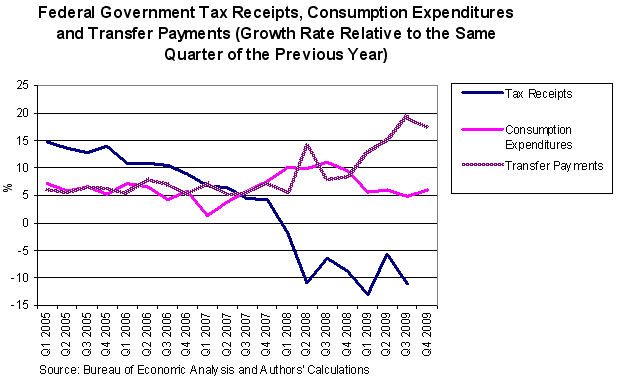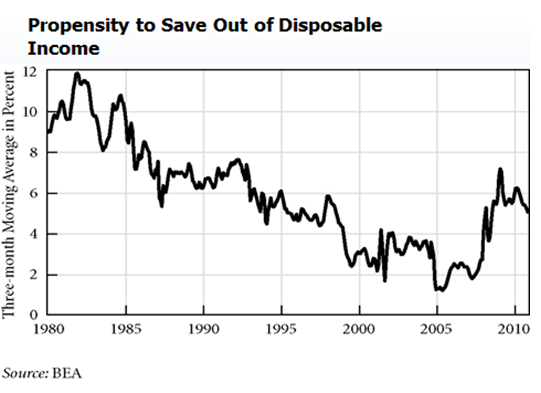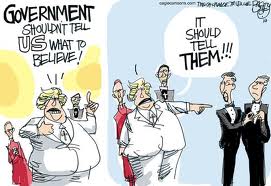By William K. Black
The Wall Street Journal published an op ed by R. Albert Mohler, Jr. on July 1, 2011 entitled “Evangelicals and the Gay Moral Revolution.” This column discusses the economic implications of Mohler’s arguments about the consequences of ending legal discrimination against homosexuals.
Mohler heads a Southern Baptist Convention (SBC) theological seminary. He argues that the “Christian church’s” foundations are shaking due to homosexual rights – and they have no exit strategy to escape. He states that only “liberal churches” (which he implicitly defines as non-Christian) can refuse to discriminate against homosexuals because they believe that such discrimination is immoral and un-Christian. The “Christian church” must discriminate against homosexuals. The SBC argues that the Supreme Court decision (Lawrence v. Texas) holding that it was unconstitutional to criminalize adult, consensual homosexual sex was improperly decided. Homosexual sex is a sin and should lead to criminal penalties. The SBC argues that Christian business people in the private sector have a constitutionally protected right (under the 1st Amendment) to refuse to deal with homosexuals as customers and employees because homosexuals are depraved sinners. Indeed, the SBC, depending on the particular context, either urges or mandates that its members discriminate against homosexuals.
Mohler argues that the SBC cannot cease condemning homosexuals and urging or mandating that its members discriminate against homosexuals. That is not accurate. The SBC, of all entities, knows that it can cease discriminating for it has done so. The SBC was created for one purpose – defending the enslavement of dark-skinned people of African descent. The SBC claimed that the inerrant word of God in the bible mandated this policy. Even after slavery ended prominent SBC members took the political lead in discriminating against blacks for over 100 years. It took roughly 150 years for the SBC to admit that it had misread the bible. The SBC’s position became that the inerrant word of God prohibited slavery.
The thrust of this column is why law and economics will combine to push the SBC towards a similar reinterpretation of the bible – and in less than 150 years. The SBC’s pro-discrimination policies will be a nightmare for businesses and the U.S. military. This will make the states in which SBC members have decisive political power increasingly unattractive as sites for national and international firms. Consider first several examples that the SBC has already raised.
The SBC boycotted Disney for years. The resolution declaring the boycott cited two primary justifications. Disney provided health benefits to its employees’ domestic partners and gay groups organized nights in which large numbers of homosexuals would attend a Disney theme park. Providing benefits to employees’ domestic partners is a common benefit that corporations find useful as a means to recruit and retain superior employees. Disney did not organize the nights when gays met in large numbers at its theme parks. What was it supposed to do – demand to know whether the customer was gay and set a quota on how many gays it would admit?
Put yourself in the position of the President of Cox Newspapers while reading the following SBC resolution concerning another SBC action that seems to threaten or encourage another boycott.:
WHEREAS, The publisher of the Dayton Daily News in Dayton, Ohio, is a committed Christian and an active Southern Baptist; and
WHEREAS, The publisher, Dennis Shere, recently made a decision to refuse advertising by gay and lesbian groups due to their detrimental effects on the family and society; and
WHEREAS, The president of Cox Newspapers, Atlanta, Georgia, parent company of the Dayton Daily News, fired the publisher of the Dayton Daily News solely on the basis of the publisher’s decision as a Christian not to legitimize homosexuality by accepting advertisement from gay and lesbian organizations; and
WHEREAS, Cox Newspapers is national in scope, owning newspapers in many cities where Southern Baptists live, such as Austin, Waco, Longview, and Lufkin, Texas; Atlanta, Georgia; Miami and West Palm Beach, Florida; and numerous other communities across the country; and
WHEREAS, The action taken against the Christian publisher by Cox Newspapers has national ramifications since it sets a precedent for other newspapers to prohibit Christians from bringing their values to bear upon their profession.
Be it therefore, RESOLVED, That the messengers to the Southern Baptist Convention, meeting in San Antonio, Texas, June 14-16, 1988, express to Cox Newspapers, Inc., our outrage over the firing of a competent, highly professional Christian solely on the basis of the employee’s commitment to defend traditional moral and family values; and
Be it finally RESOLVED, That the messengers to the Southern Baptist Convention call upon all media to refuse advertising that promotes homosexuality or any other lifestyle that is destructive to the family.
Cox did not hire Mr. Shere so that he could “defend traditional moral and family values.” They hired him to run a profitable paper. Newspapers’ principal revenue source is selling advertising space. Refusing to sell advertising space to “gay and lesbian groups due to their detrimental effects on the family and society” harmed Cox’s business interests. It is also unlikely that Cox’s President believed that selling the advertising space would harm “the family and society.” Tens of millions of employees doubtless have idiosyncratic views that their employer disagrees with. Many American employees believe that “pagans”, Muslims, women, atheists, Latinos, blacks, people with diseases or sores, and Mormons harm “the family and society.” It is common for them to ascribe these discriminatory beliefs to their religious beliefs.
There is no evidence that Cox’s president “fir[ed] a competent, highly professional Christian solely on the basis of the employee’s commitment to defend traditional moral and family values.” Cox’s president fired him because he was harming the corporation.
Consider what would happen if Cox could not fire Shere as long as he held a religious belief in favor of discriminating against particular customers or employees. Assume that Shere announces he won’t take sell advertising to any homosexual, Muslim, or politician who is a member of the Democratic Party. This becomes the biggest story in Dayton. Competing media rush to mock the station. Tens of thousands of people cancel their subscriptions and their ads. Simultaneously, the SBC threatens a boycott of all Cox media if Shere is fired. The fired employees and excluded advertisers (who may have been sought to run anti-AIDS ads) and the EEOC begin to sue Cox and the Dayton paper. Jon Stewart features Cox and Shere on his show for three days. Cox will also face a nightmare in trying to hire future top employees if they can be fired at any time because a more senior officer felt that they were a sinner. Given the fact that everyone is a sinner the SBC “freedom to discriminate” doctrine would mean that bosses could now fire anyone with impunity because of their status or non-work conduct because they viewed that status or conduct as sinful. The SBC also claims that the employer should have the right to denounce the immorality of the customer or employee. These religious rants would harm employee morale and create extremely negative publicity for the firm.
The SBC made its demand for legal impunity for discrimination explicit in its resolution opposing the repeal of “don’t ask; don’t tell.”
WHEREAS, Homosexuality is immoral, contrary to the Bible (Lev. 18:22; 1 Cor. 6:9-10) and contrary to traditional Judeo-Christian moral standards, and the open affirmation of homosexuality represents a sign of God’s surrendering a society to its perversions (Rom. 1:18-32); and
WHEREAS, Open and avowed homosexuality is incompatible with the requirements of military service according to high ranking military leaders and most military personnel; and
WHEREAS, Homosexual conduct is inconsistent with the Uniform Code of Military Justice and is detrimental to morale, unit cohesion, good order, discipline, and mission accomplishment; and
WHEREAS, Homosexuality in the military would endanger the life and health of military personnel by the increased exposure to sexually transmitted diseases and by enhanced danger of tainted blood in battlefield conditions; and
WHEREAS, Open homosexuality in the military would have significant adverse impact on the Pentagon’s budget including medical, legal and social costs; and
WHEREAS, Southern Baptist and other evangelical military chaplains may be pressured to compromise the essential gospel message, withhold their biblical convictions about this sexual perversion and submit to sensitivity training” concerning homosexuality if openly declared homosexuals are permitted to serve; and
WHEREAS, Southern Baptists and other evangelical members of the armed forces will be placed in compromising environments which will violate their conscience if the ban is lifted and will discourage other potential evangelical recruits from serving in the armed forces; and
WHEREAS, Homosexual politics is masquerading today as “civil rights,” in order to exploit the moral high ground of the civil rights movement even though homosexual conduct and other learned sexual deviance have nothing in common with the moral movement to stop discrimination against race and gender; and
WHEREAS, Government should not give special legal protection and endorsement to homosexuality, nor impose legal sanctions against those who believe homosexual conduct to be immoral.
Therefore, Be It RESOLVED, That we, the messengers to the Southern Baptist Convention, meeting at Houston, Texas, June 15-17, 1993, affirm the biblical truth that homosexuality is sin, as well as the biblical promise that all persons, including homosexuals, can receive abundant, new and eternal life by repenting of their sin and trusting Jesus Christ as Savior and Lord (1 Cor. 6:11); and
Be it further RESOLVED, That we oppose all effort to provide government endorsement, sanction, recognition, acceptance, or civil rights advantage on the basis of homosexuality; and
Be it further RESOLVED, That we oppose lifting the ban on homosexuals serving in the armed forces, and that we support passage of any legislation before Congress which restores and enforces the ban; and
Be it further RESOLVED, That we deplore acts of hatred or violence committed by homosexuals against those who take a stand for traditional morality as well as acts of hatred or violence committed against homosexuals; and
Be it finally RESOLVED, That we express our profound pride in and support of those who serve in the United States military, and for our chaplains in the military as they perform their ministry based on biblical principles and moral convictions, in an increasingly tumultuous environment.
The first thing that the resolution demonstrates is the lack of candor in Mohler’s op ed.
“We have demonstrated our own form of homophobia—not in the way that activists have used that word, but in the sense that we have been afraid to face this issue where it is most difficult . . . face to face.”
No, the SBC repeatedly demonstrated the conventional form of homophobia. Service members with “tainted blood” are discharged. (The SBC has blamed the AIDS epidemic primarily on homosexuals and further blamed them for the spread of AIDs to “innocent” victims.) The clause in the resolution that begins by deploring attacks by homosexual members of the armed services on non-homosexuals – as if straight-bashing was the problem in the armed services – is vile. It is reminiscent of the May 1906 SBC resolution against lynching that blamed the problem on unduly stringent court protections for rapists in the South and called for the removal of protections for the accused: “so that innocent and good people may rely on the law for protection rather than rush into irregular and dangerous force under methods of their own.” The resolution, of course, made no mention of the race of those being lynched in the South by the “innocent and good people.”
The SBC deepened its conventional form of homophobia in a more recent resolution about the repeal of “don’t ask; don’t tell.”
On Homosexuality And The United States Military
June 2010
“WHEREAS, The Bible describes homosexual behavior as both a contributing cause (Genesis 18:20-21; Leviticus 18:24-28; Jude 7) and a consequence of God’s judgment on nations and individuals (Romans 1:18-32);”
It’s subtle, but it’s nasty. “Homosexual behavior” is a “consequence” “of God’s judgment on nations and individuals.” Homosexuality is a curse. God has found certain “nations and individuals” guilty of being intrinsically degraded and cursed them. At this juncture the SBC sinks to the depths of Westboro Baptist and reprises the shameful history that rested on the ludicrous (but purportedly inerrant) claim that blacks were a degraded race consigned by God to slavery because they were the seed of Ham, who God had cursed (for ambiguous reasons).
The SBC resolution on the military calls on the United States not to: “impose legal sanctions against those who believe homosexual conduct to be immoral.” Again, even if that seems attractive to you the particular reader consider how many things the SBC teaches are “immoral” (swearing, yoga, and women holding positions of power over men). Under the SBC’s logic virtually anyone could be fired with impunity by any private sector employer. Indeed, if the SBC freedom to discriminate logic were adopted every corporation should immediately hire the most ultra-fundamentalist SBC member they can locate to head their HR department. Everybody does something the SBC consider “immoral” and the HR head could fire them with impunity.
The SBC’s demands for the “freedom” of it military chaplains should concern both the military and private and governmental employers.
“WHEREAS, Southern Baptist and other evangelical military chaplains may be pressured to compromise the essential gospel message, withhold their biblical convictions about this sexual perversion and submit to sensitivity training” concerning homosexuality if openly declared homosexuals are permitted to serve;”
First, whether homosexuals are closeted or out does not change any employer’s compelling interest that employees not spend their work time vilifying their colleagues. Second, the question is why any military chaplain, after the senior officers have decided to end discrimination against homosexuals, would think it appropriate to sermonize about “this sexual perversion.” The SBC teaches that God will consign the vast majority of humans to a literal, eternal hell. The SBC teaches that it is unbiblical to permit women to have a position of power over men. What is the military, or Ford Motor, supposed to do if it promotes a woman or a homosexual and a military chaplain or Ford employee responds by giving a sermon to the troops or posting throughout the office a rant denouncing the newly promoted officer as a heretic or a sexual pervert because of her gender or sexual orientation? “Biblical convictions” aren’t any more privileged than personal convictions in this context.
Anti-discrimination laws, conventional military discipline, and the economic incentives of for-profit firms are the best hope for the SBC leadership. They will discover that homosexuals aren’t depraved and female managers do not threaten any legitimate male interests. The military was strengthened when it stopped discriminating against non-whites and it will be strengthened by the end of legal discrimination against homosexuals. California will soon, whether by court decision or the next proposition, join New York in adopting marriage equality. Larger firms will find that states that continue to discriminate against homosexuals pose hiring and relocation difficulties. Heterosexual marriages will continue to be unaffected by marriage equality. The economic and moral pressures on the SBC will grow. The SBC leadership knows that its youth increasingly oppose its position on homosexuals and fears the continuing loss of disaffected members. The SBC, particularly the current leadership, has shown that it can reinterpret the bible. It will ultimately be the economy, our anti-discrimination laws and embrace of the morality of non-discrimination, and the need to keep its young that will lead the SBC leadership to find an exit strategy. The SBC’s position on religious impunity for discrimination and attacking one’s colleagues would be a nightmare for businesses. That is the principal reason why it will not prevail and why, this time, it won’t take the SBC 150 years to find an exit strategy.
















